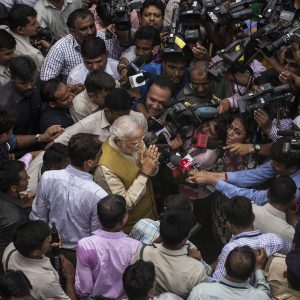Modi seeks to tame social media firms
India’s new information technology regulations, which threaten to silence dissenting voices, have put the right-wing government on a collision course with tech giants.
Author:
15 June 2021

Prime Minister Narendra Modi’s right-wing government has intensified its efforts to police speech in India by trying to control social media platforms, which are critical spaces for dissenting voices. In an ironic twist, the tech companies that are so often accused of violating users’ privacy by collecting data are suing the Indian government for attempting to do the same thing. Under the banner of “protecting” its citizens, the Indian government wants to enforce new laws that will put those critical of the state in danger.
Messaging platform WhatsApp, which Facebook owns, filed a lawsuit in the Delhi high court on 25 May against the Indian government’s new information technology intermediary guidelines. These state that social media companies have to disclose the identity of the originator of a message when asked to do so. The platform, which has more than 400 million users in India, has said this constitutes a “dangerous invasion of privacy” that poses “a threat to free speech” in the country.
The Information Technology (Guidelines for Intermediaries and Digital Media Ethics Code) Rules, which the Bharatiya Janata Party (BJP) government released in February, states that identifying the originator of information circulating on a messaging app or social media platform will provide the grounds to prevent or prosecute offences related to sovereignty, security, sexually explicit material and child abuse.
Related article:
Digital media intermediaries will have to remove content within 36 hours of an administrative or legal order being issued and will be required to provide information, including verified identities, to authorities within 72 hours. Employees of these tech companies in India can be held criminally liable for failing to comply with the government’s requests.
India’s Union Ministry of Electronics and Information Technology has claimed that tracing the originator of a message is an example of a “reasonable limitation” to which the “fundamental right to privacy is subject”. It further contends that traceability is essential to “curb the menace of fake news”. But WhatsApp, in its petition, has argued that enforcing these new rules will break the privacy principles inherent in WhatsApp’s encryption code, which ensures messages can be read only by the sender and receiver. Urging the court to overturn these new restrictions, it said the breaking of encryption could put groups such as journalists and political activists at risk.
In the petition, the tech firm highlighted a 2017 Supreme Court of India judgment, known as the Puttaswamy case, in which the court stated that privacy must be safeguarded unless legality, necessity and proportionality are all weighed against it. WhatsApp said the traceability requirement violates users’ privacy and thus contradicts the Puttaswamy judgment. “Requiring messaging apps to ‘trace’ chats is the equivalent of asking us to keep a fingerprint of every single message sent on WhatsApp, which would break end-to-end encryption and fundamentally undermines people’s right to privacy,” the company said.
Arm-twisting tactics
The new legislation is just one of many challenges Modi has levelled against global social media businesses. The right-wing government puts enormous pressure on these platforms to censor information or restrict content critical of the ruling party. Tech companies have been threatened with legal action and their employees with prison time if they refuse to comply with the government’s takedown directives.
Twitter in particular has been on a collision course with the Indian government after authorities raided the tech firm’s offices in Delhi and Gurgaon on 24 May. The police served a notice as part of a probe after Twitter tagged a ruling party spokesperson’s tweet “manipulated media”. The Modi government had accused the opposition Congress Party of creating a Covid-19 “toolkit”, which the tweet mentioned, in an attempt to subvert the government’s handling of the coronavirus pandemic and to tarnish the image of the prime minister. The Congress had allegedly termed the new coronavirus strain the “Modi strain”.
Reacting to the searches of its offices, Twitter accused the Indian government of “dangerous overreach that is inconsistent with open, democratic principles”. The social media company said it had been forced to “withhold” portions of “legitimate free speech” on its platform over fears for the safety of its employees and threats of financial penalties.
Related article:
The Modi government directed Twitter to block more than 50 tweets in April, including those by opposition party leaders that were critical of the ruling dispensation’s response to the pandemic. Twitter said it had taken action against posts in response to a “legal request” from the government, which claimed that the messages could incite panic and were misinformation.
Twitter has been battling with the Modi government since February, after India’s technology ministry asked it to block content related to the ongoing farmer protests in the country. The ministry ordered the platform to block as many as 1 178 accounts, alleging that they were spreading misinformation and provocative content. It also threatened Twitter with penal action if it failed to comply.
In the aftermath of posts by several global celebrities, including singer Rihanna and climate activist Greta Thunberg, who tweeted in support of the Indian farmers’ protests against contentious agriculture laws, India announced new information technology guidelines aimed at making social media firms more accountable to legal requests for swiftly removing posts. These warnings and dictates are seemingly aimed at limiting growing public sympathy online for the farmers’ protest as well as to gain regulatory power over tech platforms.
Twitter’s feud with the Indian government further intensified on 5 June when the social media platform removed the verified badge from Vice-President M Venkaiah Naidu’s handle. The badge was restored after the vice-president’s office objected. Twitter also dropped the blue-tick verification badges of several senior functionaries of the BJP’s ideological organisation Rashtriya Swayamsevak Sangh, including its chief, Mohan Bhagwat.
Related article:
In retaliation, India’s information technology ministry told Twitter to comply immediately with the requirements of the new regulatory guidelines or face the might of the courts. Twitter had requested that the government grant it three additional months to comply with the new requirements, which include the appointment of an Indian grievance officer to handle complaints.
In another example of how the Modi regime is attempting to suppress discontent, the Indian government sent a legal request to take action against the Twitter account of cartoonist Manjul on 5 June, claiming it “violates the laws of India”. The cartoonist has been illustrating India’s devastating second wave of the coronavirus.
Journalists MK Venu and Maya Mirchandani emphasise that what appeared to be a genuine attempt to stop big tech from gathering data is in fact a tactic to silence dissenting voices and stifle opposition. “The Indian government under Narendra Modi has had no compunctions when it comes to attempts at surveillance of citizens, of stifling dissent, of intimidating the political opposition and of waging uncontested influence wars on an unwitting public,” they said, adding that the ongoing dispute has erupted at a time when Modi is facing perhaps his most serious test yet.
Complicit in silencing dissent
While Facebook, Twitter and WhatsApp have provided spaces for opposition and dissenting voices, they have also been instrumental in amplifying Modi and his Hindu nationalist party’s reach by controlling what gets posted and what gets removed, making the platforms the de facto regulators of public discourse in India. This is why having power over these online domains has become critical for the right-wing dispensation.
The Modi government ordered Facebook to take down posts critical of its handling of the coronavirus pandemic in April. The social network complied and also temporarily blocked the hashtag “ResignModi” in India, later restoring it after severe criticism. Facebook’s compliance with the Indian government’s requests enraged its own employees, who allege that the social network has aided authoritarian governments in silencing activists and marginalised communities.
Facebook was accused of failing to censor illegal hate speech by BJP politicians last year, and came under intense criticism for bending its own rules to favour Modi’s party. Facebook India’s policy head Ankhi Das resigned after it came to light that she had made the decision not to delete anti-Muslim posts and opposed banning BJP leaders under Facebook’s “dangerous individual” tag for hate-group leaders. Das allegedly told her employees that “punishing violations by politicians from Modi’s party would damage the company’s business prospects in the country”.
Related article:
The Guardian newspaper reported that Facebook allowed a network of fake accounts to artificially inflate the popularity of a BJP member of parliament, even when it had already determined that the accounts violated its policies. BJP politicians and other Hindu nationalist groups have used WhatsApp to disseminate hate speech and disinformation that has led to violent attacks on Indian minority communities, especially Muslims and Dalits.
An avalanche of fake news amplified over the messaging site sparked a spate of mob violence and lynching across India in which dozens died. Pressured repeatedly to act, WhatsApp eventually tightened its rules on sharing and required users to give their permission before they can be added to groups, to reduce the spread of unwanted messages.Twitter and Facebook have also been criticised for shutting down pages and accounts dedicated to activism in the disputed Kashmir region and for taking down content critical of India’s rule in the region.




